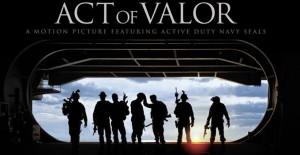 The media did not much care for the Navy SEAL “Act of Valor.” Roger Ebert called the directors “damned fools” and said it plays like a recruitment film. Variety called it a “mechanically efficient but soulless dramatization” and the Washington Post called it “macho sentimentality.”
The media did not much care for the Navy SEAL “Act of Valor.” Roger Ebert called the directors “damned fools” and said it plays like a recruitment film. Variety called it a “mechanically efficient but soulless dramatization” and the Washington Post called it “macho sentimentality.”
Before the film released, I asked Scott Waugh and Mike “Mouse” McCoy, the directors, to respond to the criticisms that would surely be coming.
What would you say to those who say these characters are flat, too good and heroic to be true? (What the Post later called “macho sentimentality.”)
“Have you met one?” said Waugh, “That would be my response. Have you met one? You should not have a response like that unless you’ve met one. Because once I think you have, it will change what your question is.”
So I went and met one, at least by phone. I spoke with a Navy SEAL who spent 11 years active duty and remains a reservist. He asked I not use his name, but blogs at the military site Blackfive under the name Froggy. He felt the movie accurately portrayed the ethos of the military.
“The movie has tremendous emotional value,” he told me, “It has inherent value, contrary to what these leftist reviewers say… “It’s propaganda.” It’s actually sort of counter propaganda. It’s standing on its own and saying ‘this is what it is.’”
“Those who are continually reenlisting and continually going down range for multiple deployments clearly have considered the cost,” Froggy continued, “And also have come to terms with the fact that they believe in it and believe what they’re doing. What the left wants to do is to create a caricature of the individual military member that is either a victim or a psychopath. This movie completely dispels that entire concept.”
“I deployed with one of the guys in the movie in 2007 to Iraq and I don’t feel any regret over what we were able to accomplish there…. I think it’s a shame response from these people that they don’t feel an internal drive to protect their country. They don’t feel they have the courage to step forward and be counted when their country is under threat, so to inoculate themselves from that shame feeling, that’s why they take on that point of view. I don’t begrudge anyone their personal choices about military service or not. It’s not for everybody. Seal team certainly isn’t …We run so many people off. It is, to me, really unbecoming, to have a group of people who out of their own shame, try to impugn false motivations on people who are courageously stepping forward and moving toward the sound of gunfire instead of running away.”
He said military people approach movies with skepticism, “SEALs are skeptical, everybody’s worried. After all the disappointments and all the GI Jane and Charlie Sheen and all this other crap and you’re going ‘Do we have to go through this another time?’ and then you go see [Act of Valor] and you go ‘Wow this brought me back to the teams.’”
“I’ve watched the movie a few times. I’ve done every single thing in that movie. I feel like I’m getting an adrenaline rush, it’s real to me. It hits me in a place, like this is how I felt. It brought me in that path that I’ve done those things and rekindled those feelings that I had at the time.”
What about the charge that it’s military propaganda or a recruitment film?
“If you look at the sacrifice that’s portrayed in this film, it’s impossible to call it that,” argued McCoy before the movie release, “If you’re promising what we show in this film, it’s the exact opposite. I actually think it’s extremely responsible in that way. If you choose this occupation, it’s a very difficult place to go to work and the risk potential is really significant.”
“And the conversation now is about downsizing,” Waugh said, “We want this movie to raise awareness about how much these guys have sacrificed for us. Let’s talk about getting them a job, thinking about them and appreciating them.”
Waugh continued, “I think it’s to bring awareness to the American public to say the war is coming to an end and these men are coming home and let’s not have history repeat itself. Obviously, Vietnam, the men came home and they were not supported when they came back. Let’s not do it again 40 years later.”
More on Act of Valor:
Review: “Act of Valor” is a Warrior Manifesto that Rejects Your Pity
Listen to Waugh and McCoy on our RedState Movie Mafia podcast.












